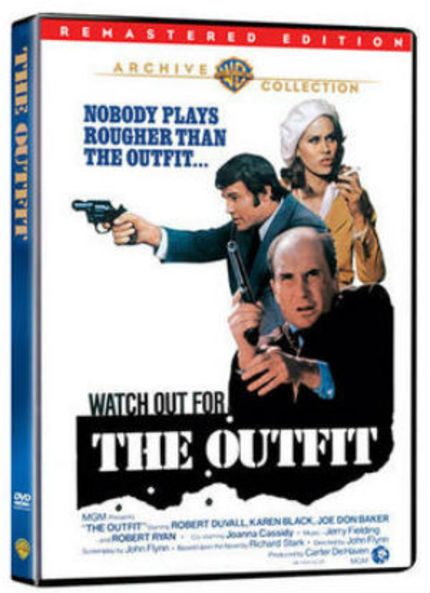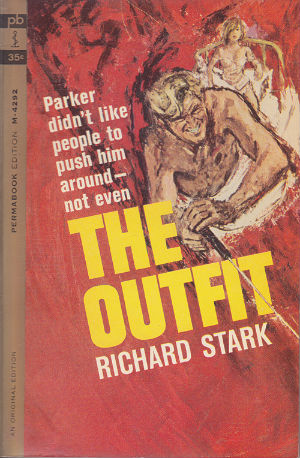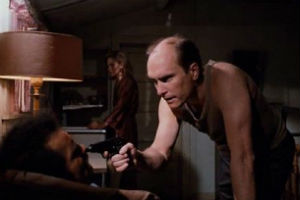70s Rewind: THE OUTFIT Showcases the Real Parker

In Parker, which opens wide on Friday, January 25, Jason Statham will be the latest in a long line of actors to play a professional criminal originally created by Donald E. Westlake in 1962.
Westlake, aged 27 or 28, had become self-supporting as a writer by publishing one mystery novel per year (in hardcover) for publisher Random House, but he wanted to write more than one book a year, and came up with the idea of writing paperback originals targeted specifically at the male audience. He decided to write in language that was "stripped down and bleak," and used the pseudonym Richard Stark to remind himself of what he was attempting to do. ("Richard" was in honor of Richard Widmark, one of his personal heroes.)
He created a character with no "reader-friendly" characteristics; Parker was tough and he was mean and he was destined for jail at the end of The Hunter, except that an editor liked the character and wanted Westlake to write a series, and so Parker walked free and ended up the anti-hero in 16 novels published between 1962 and 1974. Westlake returned to the character in 1997 and wrote eight more books starring Parker before the author's death in 2008.
Translations of Parker to the big screen began with Jean-Luc Godard's Made in U.S.A., with Anna Karina, which was loosely inspired by 1965's The Jugger; Lee Marvin embodied the character in John Boorman's Point Blank, based on The Hunter (also the source for 1999's Payback with Mel Gibson), and Jim Brown played him in 1968's The Split.
Robert Duvall in 1973's The Outfit, however, was "perhaps the closest to Parker," according to Westlake in an interview included on the Payback director's cut DVD. "What Robert Duvall did was a wonderful, terse, taciturn Parker. He just did a nice job. ... They just did it very fast."
 John Flynn adapted Westlake's novel. (Supposedly, he wanted to set the movie in the late 40s, but the studio balked at the added expense, so a modern-day setting was retained.) Westlake declined to allow Parker's name to be used, unless the producers promised to make a series of films, so Flynn called his lead character Earl Macklin, introduced Macklin's accomplice Cody (Joe Dan Baker) much earlier in the story, greatly expanded the role of Bett (Karen Black), making her Macklin's girlfriend rather than the sexual playmate described in the book, and changed around other characters as well. (Among other things, he made the narrative more straightforward in a chronological sense.)
John Flynn adapted Westlake's novel. (Supposedly, he wanted to set the movie in the late 40s, but the studio balked at the added expense, so a modern-day setting was retained.) Westlake declined to allow Parker's name to be used, unless the producers promised to make a series of films, so Flynn called his lead character Earl Macklin, introduced Macklin's accomplice Cody (Joe Dan Baker) much earlier in the story, greatly expanded the role of Bett (Karen Black), making her Macklin's girlfriend rather than the sexual playmate described in the book, and changed around other characters as well. (Among other things, he made the narrative more straightforward in a chronological sense.)
The main thrust of the story, though, remains the same: Macklin has been wronged by organized crime, and he intends to make them pay.
In this version, Macklin, his brother, and Cody robbed a bank without realizing it was owned by The Outfit (i.e., organized crime). Macklin is caught and imprisoned, but his brother is located by the Outfit and killed, in a spare, concise opening sequence that nicely sets the tone for the movie.
Macklin decides the best way to get the Outfit's attention -- and let them know he's serious -- is to begin robbing them, which he and Cody (with Bett's assistance) begin to do in cold and efficient fashion. Unaccustomed to dealing with professional thieves, the soft underbelly of the Outfit is revealed, incurring the wrath of mob boss Mailer (Robert Ryan).
At this point, Flynn had two feature films to be his credit, as well as several years of experience as an assistant director to the likes of John Sturges (The Great Escape) and J. Lee Thompson (John Goldfarb, Please Come Home!). His style is economical and efficient, with a minimum of set-ups, and never distracts from the material. He'd next make the cult classic Rolling Thunder. The very experienced Bruce Surtees served as director of photography; this came after Dirty Harry and just before Lenny and Night Moves, which provides a good frame of reference for the type of work he was doing. And Ralph E. Winter was film editor; his career stretched back to the 1940s and included an Academy Award for Ben-Hur.
 Duvall, post The Godfather, was in his glory as a rough-hewn leading man, the sort of unlikely star who seemed commonplace in the 70s, but is rare today. His Parker / Macklin is a counterpoint to the ex-cop he played in Badge 373, a character based on the adventures of veteran NYC Police Detective Eddie Egan, and fits comfortably within the niche of films about cops, crime, and corruption. (There must have been something in the air: Sidney Lumet's Serpico came out the same year, and so did the underrated Cops and Robbers, which I've written about before.)
Duvall, post The Godfather, was in his glory as a rough-hewn leading man, the sort of unlikely star who seemed commonplace in the 70s, but is rare today. His Parker / Macklin is a counterpoint to the ex-cop he played in Badge 373, a character based on the adventures of veteran NYC Police Detective Eddie Egan, and fits comfortably within the niche of films about cops, crime, and corruption. (There must have been something in the air: Sidney Lumet's Serpico came out the same year, and so did the underrated Cops and Robbers, which I've written about before.)
Joe Don Baker was in a great stretch of his career as well; he starred as real-life Sherif Buford Pusser in Walking Tall, which was released early in 1973, and had also made a deep impression in Don Siegel's Charley Varrick, which, again, was a similar type of crime picture that was sanguine about the illegal nature of its hero's exploits. The cast was very strong, down to the bit players, featuring appearances by Richard Jaeckel, Sheree North, Bill McKinney, Elisha Cook, Marie Windsor, Jane Greer, Henry Jones, and Joanna Cassidy.
Surrounded by cagey studio veterans on his crew, and bolstered by experienced, non-flashy actors in his cast, Flynn made a modest picture that is, nonetheless, a stone-cold perfect crime flick. Duvall feels like the perfect embodiment of Parker; he's not an unfeeling, emotionless robot. He's fully capable of exploding in anger, of experiencing loss, of being tricked and out-thought. But he recovers quickly, and exercises an unnerving degree of self-control.
He's a thief, and he doesn't care about you; he just wants your money.
The Outfit is available on DVD from Warner Archive in a remastered edition that looks aces. Note, however, that it's not restored, so expect occasional imperfections in the source material. It's a MOD (manufactured on demand) product, with the original theatrical poster serving as cover and the original theatrical trailer included.
(70s Rewind is a column about the writer's favorite movie decade.)






 (1)-thumb-80x80-93563.jpg)
